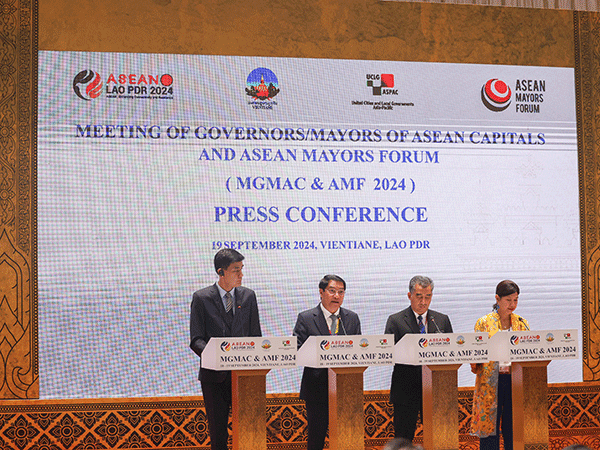 |
| The Mayor of Vientiane, Dr Athsaphangthong Siphandone, speaks at a press conference. |
ASEAN mayors agree on key steps for sustainable urban development
ASEAN capital leaders have reaffirmed their commitment to advancing sustainable urban development, the Mayor of Vientiane said at a press conference on Thursday following the close of regional meetings.
Dr Athsaphangthong Siphandone made the announcement following the Meeting of Governors/Mayors of ASEAN Capitals (MGMAC), the ASEAN Mayors Forum (AMF), and the Annual Meeting of the AIMF Regional Network in South-East Asia, which took place in Vientiane from September 17-19.
The meetings brought together mayors, vice mayors, and city representatives to discuss pressing urban challenges and share strategies for regional growth.
The discussions also aligned with the broader theme of Laos’ ASEAN Chairmanship in 2024, “Enhancing Connectivity and Resilience”.
Five key thematic areas were discussed: sustainable and liveable cities, green tourism, sustainable economic development, environmentally sustainable cities, and climate resilience.
Speaking about the future of urban development, Dr Athsaphangthong highlighted the long-term goals for the region.
“We reaffirm the commitment of ASEAN capitals and cities to foster innovations and to mobilise resources in driving sustainable urban development in line with the 2030 Agenda, the Paris Agreement, and the New Urban Agenda global goals,” he said.
He emphasised the importance of intra and inter-regional partnerships to position Southeast Asia as a hub for economic growth and a key driver of global progress, complementing the ASEAN Community Vision 2025.
A key outcome of the meetings was the adoption of the Vientiane Declaration, a document that charts the path for ASEAN capitals to collectively address urban development challenges.
At the heart of the declaration is a commitment to bolstering connectivity across the region by enhancing transport networks and digital infrastructure. Strengthening these systems is viewed as essential for promoting economic growth, fostering cultural exchange, and facilitating closer cooperation among ASEAN cities.
The declaration also underscored the need to address climate resilience. With urbanisation and climate change posing increasing risks to cities, ASEAN leaders agreed to prioritise sustainable urban planning and environmental protection measures.
The discussions emphasised the importance of disaster preparedness, water management, air quality improvement, and climate adaptation initiatives to safeguard communities and ecosystems across Southeast Asia.
In addition, the meetings highlighted the need for inclusive development. ASEAN capitals committed to empowering their local populations, especially vulnerable groups, by ensuring better access to education, healthcare, and essential social services.
Leaders stressed that fostering a sense of ownership among citizens is vital for long-term sustainable urban growth.
Innovation was another key focus. The leaders agreed to embrace digital transformation, smart city technologies, and green innovations as drivers of urban solutions.
They called for closer collaboration among cities, academia, and the private sector to accelerate the adoption of cutting-edge technologies for sustainable development.
The preservation of cultural heritage was also a priority, with leaders pledging to promote cultural exchange and safeguard the rich diversity of ASEAN’s traditions and identities.
The meetings concluded with a strong call for multi-stakeholder partnerships, emphasising the importance of collaboration between ASEAN institutions, international organisations, and the private sector in achieving sustainable development goals.
The outcomes of the meetings will serve as a foundation for further discussions at the 44th and 45th ASEAN Summits, set to take place in Vientiane next month.
By Times Reporters
(Latest Update September 20, 2024)
|


